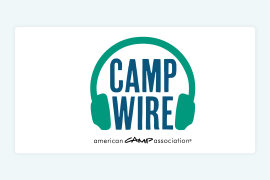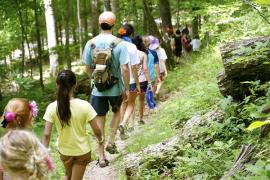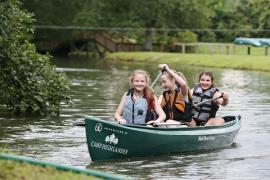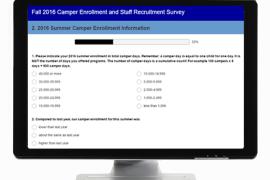Edited on April 27, 2018.
Young people are diverse and dynamic, and they have myriad pathways to success. Unfortunately, youth development research often highlights watered-down averages of sample sets that offer limited insight and inspiration, in part because they don’t represent the youth that organizations serve. At Algorhythm, we know that what works for some does not work for all. That’s why we’re excited to be able to deliver fresh insights and relevant benchmarking to more than 400 youth serving programs nationwide with our Youth Development Impact Learning System (YDiLS). And this year we’re especially excited to share the system’s findings about the impact of camps.
What Is the Youth Development Impact Learning System?
The Youth Development Impact Learning System is a smart, easy-to-use, cloud-based platform that guides its members through evaluating and continuously learning about their youth programs. Our membership comprises a diverse community of hundreds of organizations and programs that engage thousands of youth nationwide. And our algorithm is built to capture and speak to the intricacies of that diversity.
Always learning and constantly refreshing, our community is as vibrant as the young people it serves. We believe we are smarter together. And thanks to the YDiLS, we know we’re making meaningful change.
What Has the YDiLS Learned about Camps?
This year, like every year, Algorhythm’s team analyzed YDiLS data from 150 programs that engage more than 4,000 youth. Our goal was to identify which programs were having the greatest impact on their youths’ social and emotional growth so we could celebrate and learn from their success.
So, what did we discover? Nearly half of this year’s high impact programs were camps! This was an extraordinary finding, especially given that, in total, our 2018 HI Impact Award Winners represent just the top 15 percent of all the programs in the system.
On the other hand, it makes total sense.
Camps are extraordinary places to cultivate relationships. Even camps with shorter schedules create powerful connections because they provide a unique environment for learning and daily opportunities to bond with others:
Camp counselors and staff are focused on creating fun experiences for campers and promoting positive relationships among them. Many camp practices and traditions — singing, dancing, telling stories and jokes, and playing outdoors — increase positive emotions, which lead campers to feel what they describe as “happiness.” Children at summer camp have ample, daily opportunities to connect with other people and therefore, are — in fact — “happy campers.” 1
Put another way, adults and youth counselors prioritize youth. Accordingly, youth attending the camp programs we studied reported that adults:
- Asked them about their experiences and interests;
- Listened to them;
- Helped them explore their current passions and discover new ones;
- Challenged them to stretch and take risks; and
- Helped them see that “failure” can be just another wonderful learning opportunity.
As a result, youth felt connected, respected, and engaged in meaningful decision-making: they built positive relationships with adults.
The Power of Relationships: Emerging Research
In 2017, Algorhythm analyzed Youth Development Impact Learning data, representing 4,980 youth from 94 programs nationwide, and discovered that positive relationships beat type of activity, age, ethnicity, and gender as a predictor of positive social and emotional learning (SEL) outcomes for youth.2 In fact, programs that purposefully created space for relationships had twice the impact as others in the system. The data also showed that positive youth/adult relationships were pivotal in bridging the disparities between “low asset” youth (those coming into programs with fewer SEL capacities) and “high asset” youth (those with many SEL capacities).3
Supporting our findings, two recent Search Institute studies have also demonstrated similar results:
- A survey of 1,085 US parents showed that positive youth relationships are ten times more predictive than demographics in influencing mastery of SEL skills4; and
- An analysis of more than 25,000 youth surveys found that when youth have a greater number of positive relationships with adults, they increase their academic motivation, social-emotional skills, and responsibility. They were also less likely to engage in risky behaviors.5
In Conclusion: So What?
For too long, camp programs have been impeded by the limitations of traditional “evaluation,” forced to focus on counting hours, attendance, or activities without knowing if or how these things are helping them accomplish their goal of promoting whole child development.
The Youth Development Impact Learning System is finding that camps provide a powerful setting for promoting positive youth/adult relationships, and the data shows that these relationships are having a profound impact on SEL growth. It is our hope that this new information can help camps make the case for focusing even more of their energy and resources on building and supporting relationships that count. We joined ACA's Research 360 Initiative for a webinar on Wednesday, April 25, to help interested camps learn more about how the Youth Development Impact Learning System works. Several of our HI Impact camps also joined the webinar to share the practices they think are making a difference.
We are currently developing case studies on each of our 2018 HI Impact Award Winners and look forward to discovering more about how these camps are helping young people to grow. Follow Algorhythm’s blog — or the Youth Development Impact Learning System Facebook Page — to learn more as we continue to lift up and celebrate their amazing work!
1Monke, A (November 2015). The Impact of the Camp Experience on Social Skills and Happiness. https://www.acacamps.org/resource-library/camping-magazine/impact-camp-…
2Sabo Flores (2017). The Art and Science of Creating Effective Youth Development Programs. Youth Inc., Algorhythm & New Corp. https://algorhythm.io/wp-content/uploads/2017/01/Algorhythm-The-Art-Sci…
3Doyle Lynch and Sabo Flores (October 19, 2017). Social and Emotional Learning and the Power of Youth Adult Relationships. Algorhythm blog. https://algorhythm.io/social-emotional-learning-power-adult-youth-relat…
4Roehlkepartain, E. C., Pekel, K., Syvertsen, A. K., Sethi, J., Sullivan, T. K., & Scales, P. C. (2017). Relationships First: Creating Connections that Help Young People Thrive. Minneapolis, MN: Search Institute.https://www.search-institute.org/wp-content/uploads/2017/12/2017-Relationships-First-final.pdf
52016 Survey of 25,395 adolescents in grades 6-12 in diverse city in western U.S.
Dr. Kim Sabo Flores is the CEO for Algorhythm.
Photo courtesy of Camp Howe in Goshen, Massachusetts
Thanks to our research partner, Redwoods.
Additional thanks goes to our research supporter, Chaco.
The views and opinions expressed by contributors are their own and do not necessarily reflect the views of the American Camp Association or ACA employees.





